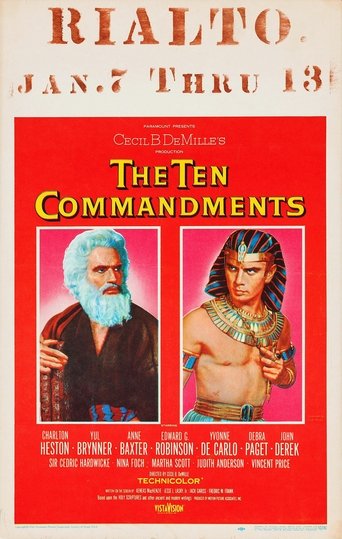Watch The Ten Commandments Online

The Ten Commandments — The Church of God International. We live in a world filled with lawlessness. In most societies, murder, theft, adultery, deceit, and perversity are commonplace. Many, even in religious communities and among human behavioral specialists, scoff at the idea of moral absolutes that apply universally.
How old is the Torah, the first five books of the Hebrew Bible? As with most such questions about disputed religious texts, it depends on whom you ask. Many. A trio of Pennsylvania churches have distributed approximately 1,500 signs with the Ten Commandments in response to the removal of a Decalogue display from a regional. Memorize the ten commandments in minutes using your fingers as cues! Easy for children or adults! I. The Ten Commandments As the head of the family should teach them in a simple way to his household. The First Commandment. Thou shalt have no other gods.
One man’s morality, it is believed, is another man’s immorality. What seems unnatural and abnormal to one is considered perfectly normal and natural for another. In the last several decades, the Western World has witnessed an increasing acceptance of homosexual behavior as normal and natural, of abortion as a right, and of premarital cohabitation as a healthy alternative to marriage. Time- honored Judeo- Christian standards are being challenged, even by professing Christian clergymen, some of whom are calling for a new reformation, claiming that Christianity must abandon its belief in a God who punishes sinners and radically revise many of the moral standards it inherited from its predecessors. But God does not change!
He made human beings in His own image and after His likeness and gave them specific instructions on how they were to relate to Him and to each other. In other words, He gave them His HOLY LAW! The Law of Love. God’s law is summarized in one word—love. When asked to identify the “great commandment in the law,” Jesus Christ replied,You shall love the Lord your God with all your heart and with all your soul and with all your mind. This is the great and first commandment. And a second is like it: You shall love your neighbor as yourself.
- 1. The first of the positive commandments is the mitzvah to know that there is a God, as [Exodus 20:2] states: "I am God, your Lord." א. מצוה ראשונה.
- Alighthouse.com is Your number (1) website for sending free christian eCards, alighthouse.com has been spreading Jesus love and light throughout the entire world.
- As a new teacher I remember getting into my classroom for the first time. I set up the space like classrooms I had seen before and enjoyed; I got my lesson plans in.

Cast, crew and reviews from the Internet Movie Database.

On these two commandments depend all the Law and the Prophets (Matthew 2. This is God’s law in its simplest form. The two commandments are an indissoluble unit—one law—and are universally binding. One cannot keep only one of the two commandments, for to hate one’s neighbor is to fail to love God, who commands one to love one’s neighbor. John put it this way: If anyone says, “I love God,” and hates his brother, he is a liar; for he who does not love his brother whom he has seen cannot love God whom he has not seen.
And this commandment we have from him: whoever loves God must also love his brother (1 John 4: 2. John twice reminds us “God is love” (1 John 4: 6,1. Genuine love flows from Him, and through loving Him (who first loved us), our capacity to express love is perfected. Therefore, to fail to love God with all our being is to fail to love our neighbor as we should.
We see, then, that the commandments to love God with all our being and our neighbor as our self are two aspects of one indivisible law, with the two commandments so linked that it is impossible to obey one and not obey the other or break one without breaking the other. Watch Santa Claws Online Mic there. To break one point of the law of love is to fail to love; thus, the whole law is broken. Interestingly, Jesus was not introducing a brand- new law when He named the two preeminent commandments. He was simply quoting from the Old Testament—right out of the old “Law of Moses.” The first commandment is a part of the famous Shema, or Hebrew confession of faith, which was recited in the synagogues every Sabbath; and the second commandment was taken from the book known for its exposition of the ceremonial law—the book of Leviticus. Hear, O Israel: The LORD our God, the LORD is one. You shall love the LORD your God with all your heart and with all your soul and with all your might (Deuteronomy 6: 4–5).
You shall not take vengeance or bear a grudge against the sons of your own people, but you shall love your neighbor as yourself: I am the LORD (Leviticus 1. The law of love is also mentioned in the New Testament epistles (Romans 8: 2. Corinthians 2: 9; Galatians 5: 1.
John 4: 1. 8–2. 0; 5: 2; James 1: 1. New Covenant. It is as binding today as it ever has been at any time in the past. To fulfill God’s moral and ethical requirements, all you have to do is love Him with all your being and love your neighbor as yourself. Love, however, is not a mere sentiment or “warm fuzzy feeling.” On the contrary, love—godly love—“does not insist on its own way” (1 Corinthians 1. This means that the person possessing this kind of love is not guided by his or her natural inclinations or things that feel good.
Genuine love involves loyalty, commitment, and generosity. It is a way of life, not a temporary emotional response. Watch Night Owls Online Hollywoodtake. God’s law of love, as we have noted, consists of two general commandments: You shall love God with all your being, and you shall love your neighbor as yourself. These two commandments, forming one indissoluble law, are further defined through the ten moral categories set forth in the Decalogue, or Ten Commandments. The Decalogue: the Law of Love Spelled Out.
One can easily prove from Scripture that the law of love and the Decalogue are one and the same law. The Decalogue, therefore, is an indissoluble unit of divine law. To break one of its commandments is to break the whole law. James put it this way: If you really fulfill the royal law according to the Scripture, “You shall love your neighbor as yourself,” you are doing well.
But if you show partiality, you are committing sin and are convicted by the law as transgressors. For whoever keeps the whole law but fails in one point has become accountable for all of it. For he who said, “Do not commit adultery,” also said, “Do not murder.” If you do not commit adultery but do murder, you have become a transgressor of the law (James 2: 8–1. Notice these points: (1) The “whole law” James speaks of is the Decalogue. It has ten “points,” and James cites two of those points. James sees the Decalogue as an indivisible unit of law. To “stumble in one point” is to be “guilty of all,” for the individual commandments come from one Source.
The “royal law”—“You shall love your neighbor as yourself”—is obviously a summation of the commandments that pertain to human relationships. James links the “royal law” with the “whole law,” or Decalogue. Jesus, in His reply to a wealthy young man inquiring about what “good deed” he should do to have eternal life, said, “If you would enter life, keep the commandments” (Matthew 1. When the young man asked, “Which ones?” Jesus replied by naming five of the Ten Commandments, each having to do with human relationships, and summarized these by citing the commandment, “You shall love your neighbor as yourself” (verses 1.